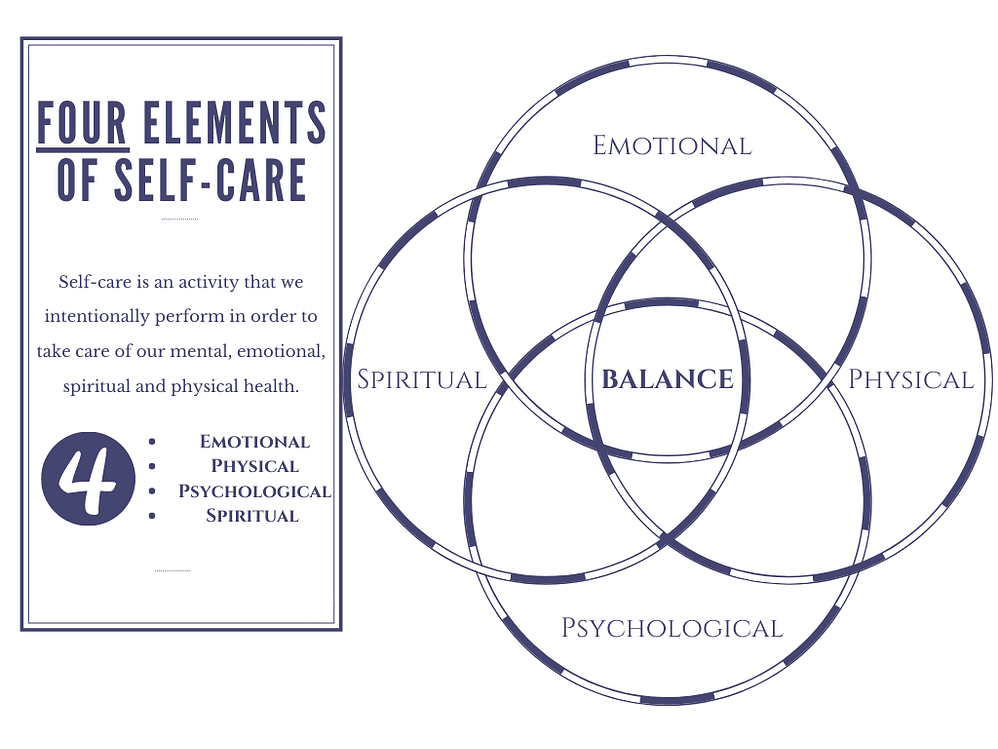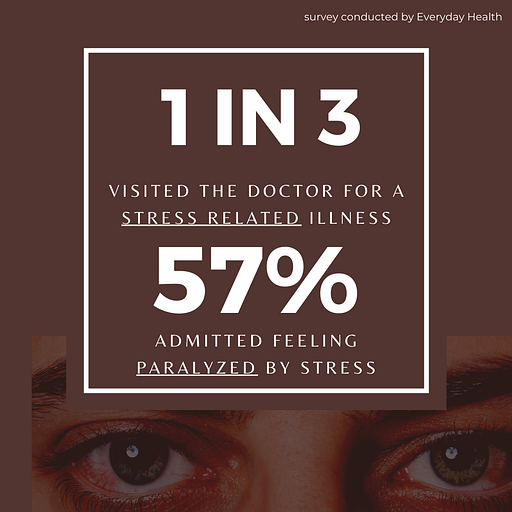It is easy to see that the journey to self-care can be thorny. People often fall into traps in their attempt to take care of themselves. Why is this the case? It is because everything that feels good does not particularly help your self-care practice. People use various unhealthy coping mechanisms to feel good, which they often mistake as types of self-care during turbulent times. For instance, using drugs, alcohol, gambling, over-eating, isolating and more.
Before we deep dive into the 4 types-of self care lets’ look at some common signs you need self care. And what you can do today to care for your needs without taking up all of your time! So, in order to build a solid self-care foundation, let’s identify some common side effects you might be experiencing…
5 Signs You Need Self Care In Your Life.
Estimated reading time: 22 minutes
1). Uncontrolled Stress.
Stress is widely misunderstood. On one hand stress is vital to our survival as humans. It’s responsible for increased alertness, decisiveness and action. However, stress can build and if not managed properly, can wreak havoc on your body, mind and more. So what exactly is uncontrolled stress?
Uncontrolled stress is a reaction to how we as individuals manage stress. Everyone is different, and our coping mechanisms vary greatly. But understanding how you respond to stress is critical to crafting a self care routine that helps challenge and alleviate this built up stress. First, here are some common signs that you might have uncontrolled stress in your life.
- Anger outbursts
- Crying spells
- Numbing (alcohol, drugs, etc)
- Overeating
- Poor sleep
- Depression
- Pain and muscle soreness.
2) Your time is controlled by others.
One of the most common complaints about growing up is not having any time for yourself. Between work obligations, family and more putting some time on the calendar for you is often a pipe dream. But, if you aren’t caring for your needs consistently, everyone around you suffers, including you. By taking time to yourself to heal and recharge will enable you to care more deeply for your loved ones as well. And they will notice this change in you.
It might seem counterintuitive but taking time to practice the different types of self-care for your needs is incredibly UNSELFISH. Understand that when you care for your needs and you feel great about who you are, that positive energy rubs off on your loved ones as well. Although hard work is important, be careful not to confuse overwork with hard work. Remember, everything turns back on when you unplug for a little bit. Even you.
3) You’re your worst enemy.
Have you ever noticed that person we talk to most in life is ourselves? And what’s more alarming is most of this talk is negative in nature. We constantly tell ourselves we aren’t good enough, we don’t have the talent, or we don’t deserve happiness. Often times this negative self talk is wrapped in feelings of shame and guilt. The negative feelings are deeply rooted from past mistakes and if we aren’t careful, we become our worst enemy. This is one of the biggest signs you need self care in your life. Try talking to yourself like you would your best friend. If your friend made a mistake, would you berate them for that mistake? Probably not.
So why do we treat ourselves differently? Pay attention to the words you choose and go easy on yourself. Everyone makes mistakes, the important thing is to learn from these mistakes and move forward. It’s rarely if ever useful to talk down to yourself. Be your own parent. Be your own best friend and use words that comfort and support you, not tear you down.
4) Your support network needs work.
After a year like 2020, it’s easy to fall into this. Our support systems and network of individuals that we can trust and rely on has gone away, wreaking havoc on all types of self-care practices.. Much of this is due to isolation and distancing, but that doesn’t mean we can’t continue to nurture our support network. Reach out to the friends that have similar aspirations and goals as you do, and be wary of the ones that are showing signs they need self care too. We are creatures of habit and if our network of support is depressed, overusing alcohol/drugs and more we adopt these behaviors as well. No one is immune to this.
So be vigilant in who you keep in your support network as this can be all the difference from feeling overwhelmed and stressed to a life in balance. Having one or two trusted individuals that you know will support you is vital in your journey to keeping yourself healthy and happy in the new year.
5) Unpredictable mood
Increased irritability is another common sign you need self care in your life. Moodiness can stem from a host of related incidents. And having trouble managing your mood is a sign you’re out of balance somewhere. Notice your mood and take inventory of everything that is stressing you out. This can be work, family, the news and more. Once you’ve taken inventory, create a list of things you can control and the things you can’t. A lot of stress is over things that we actually cannot control, and thus need to understand that the moodiness is a result of uncontrollable events. Such as the constant beratement of bad news on feeds. We can’t control this news but we ‘feel it’. By focusing on what you can control you can drastically limit this moodiness in your own life.
Oftentimes, organizing the ‘mess’ or ‘to-do list’ in an actionable way can help with this. Limit frustration and anger by having a clear action plan on how to tackle whatever is stressing you out. By ignoring this moodiness you may be missing out on some bigger problems in your life that require attention.
4 Types of Self-Care
When you comprehensively take care of yourself, you’ll, by default, have balanced physical and mental health, feel more active, improve your immunity, increased self-awareness, have gratitude, and be more productive. However, to discuss self-care elaborately, it is important to delve into its most important subsets of self care.
All of these signs you need self care are commonplace. And many suffer from one or many of these on a daily basis. But understanding what your response is to stress can help move through it and not fall into these negative responses to stress. If stress keeps you awake at night, develop a self care night routine that will put you to sleep fast. Or if built up stress is causing numbing behavior, understand that this is avoiding the problem. It is not confronting it and moving through it. Now you know the signs you need self-care, but where to start? Next, we will take a deep dive into the 4 types of self-care that set a solid foundation for you to easily manage whatever life throws at you!

Continue reading for ways you can incorporate these different types of self-care elements into your life!
Physical Self Care
Health is wealth, and current times have made it clearer than ever before. When discussing self-care, the first type of self-care that immediately comes to mind is physical self-care. These days, people’s lives are surrounded and immersed in unhealthy elements, starting from hectic professional life to fast foods, uncontrolled stress, lack of sleep, and more. We keep working to make our lives better only to find out we are doing just the opposite.
As mentioned earlier, the principle of self-care is about finding the right balance, and it is the same with physical self-care. You have to know what’s good and bad for your physical health and draw a line where you need to. Give your physical health the priority it rightfully deserves because the only thing in this world that is truly yours is your body. If you are entangled in confusion as to how to start a physical self-care routine and what to do and what not to do, we will help bring clarity through the points mentioned below –
Take Rest
Your body is a biological machine, and it needs rest. When you stop giving it the rest, it needs to recharge, thinking nothing will happen, it will prove you wrong sooner than you can imagine. Don’t live in the bubble that you’re young, and nothing will happen to you. It is important to know when your body can’t take anymore and give it the rest it deserves after a long day. Instead of scrolling through social media platforms, give your mind, body, and eyes some rest and put that phone or laptop aside. Maintain a proper sleep routine and get at least 7-8 hours of sleep every day is critical for all types of self-care.
Eat Healthy
You are what you eat, or your food becomes you. Put it whichever way you want, but the food you eat makes a huge impact on your health. It can make or break your body. Make sure you’re eating healthy and having a balanced diet, and not living off coffee and junk food, which has become common among youth and middle-aged people these days. Don’t make excuses that you don’t get time to cook healthy or you’re tired. You make time for what’s important. Your health, body, and your food are important. Don’t take your health for granted.
Exercise Daily
When it comes to physical self-care, the discussion about exercise goes without saying. Exercising has become more important today than ever before because most people have a day job of sitting in front of their computers all day. People hardly do any physical activity except for commuting to and from home and office. Go for a jog every morning or workout at a local gym, or try to find time to do yoga at home. There are many exercises you can do at home without needing any piece of specialized exercise equipment. Taking out half an hour to an hour of your time every day for this type of self-care can make a huge difference if you really mean yourself well. Don’t overdo it too, and try to find a balance.
Drink Water
Staying hydrated is important for your body. While everyone knows it, few of us do deprive ourselves of the minimum amount of water our body needs to function optimally. Drink water periodically throughout the day, and if you’re careless about it, set reminders. Avoid having fizzy drinks and replace them with water. It helps eliminate toxins from your body, keeps you healthy, and ensures you stay active.
While there are numerous ways for physical self-care, those mentioned above are the fundamental ways you just cannot ignore or skip. The cost of ignoring these physical self-care ways can be really expensive. Having discussed the topic of physical self-care briefly, let us move to understand emotional self-care intricately.
Emotional Self Care
Our physical health is dependent on our emotional health and vice versa. Every part of our being is interconnected and interdependent. When you’re happy, you’ll automatically be more productive, feel good, be more active, and have the energy, motivation, and resilience to take on any task, no matter how challenging it is. When you’re feeling low or sad, you won’t feel like doing anything; forget about taking on a challenging task. You won’t be working to your full potential, and it will reflect in your work as well and, most importantly, would negatively impact your personal life and relationships.
Emotional self-care is all about finding ways never to get knocked down by challenges, whether professional or personal. When you believe in yourself and are hopeful about a better tomorrow, today’s difficulties don’t seem that bitter after all. In other words, you need to manage and nourish your emotional well-being, as it’s crucial for all types of self-care. Let us discuss a few tips for emotional self-care
Let Go
Whether it is a relationship, people, heartbreak, failure, loss of a loved one, or any other trauma or negative set of emotions, it is important to embrace it first with all your being and then let go. Life is all about ‘keep on keeping on,’ and you can’t stay stagnant in one place due to a bumper on the way. Let go of negativity, hate, anger, sadness, or any other feelings that stop you from being you or not letting you exploit your full potential in life.
Move On
Once you let go of negativity in your life, whether it is relationship, people, or emotions, you’ll find it easier to move on. Negativity, fear, insecurities, over-thinking, anxiety, and other such emotions block our road and don’t let us move on. However, it is important to keep reiterating to ourselves that you’re meant for more than this and that you’re better than this. Condition and train your brain not to let negativity overpower you. It helps you stand your ground no matter how tough it gets and empowers you to move ahead in the right direction.
Don’t Hold Grudges
When you hold a grudge against someone because they wronged you in some way, you tend to live that exact moment and feel the same way when you were wronged, over and over again. It keeps inflating the bubble of hate and anger inside you that comes out in different ways. It constantly keeps you upset and doesn’t let you live your life vibrantly because you’re constantly glued to negativity. Negative thinking and holding grudges has a massive impact on all types of self-care.
Engage With Emotions, Don’t Hide
We often feel emotionally drained because we are used to suppressing negative emotions rather than engaging with them head-on. And understanding this is a critical element in balancing the Don’t play hide and seek with your emotions, and feel them because you can’t attain emotional peace till you don’t deal with emotions that are troubling you inside.
Find Purpose
People with a clear purpose in life are not easily jolted off balance because they know what they want, where they are heading, and what to do to fulfill their purpose. Anything that comes in between them and their purpose is not given importance. Find a purpose in life to anchor your emotions from swaying too much too often. It helps you get the clarity you need to focus more on what’s important than burning the midnight oil in fear, insecurities, anger, hatred, and being ungrateful to what you have.
Have you manifested the things you want but still feel unfulfilled? Or maybe you’re stuck and unable to create the life you really want to live? Try Michael Beckwith’s FREE course on discovering your life’s purpose and listening to your soul!
Free Masterclass: A Formula To Discover Your Life Purpose
Manage Stress
One of the key ingredients to emotional self-care is to manage stress. When you’re constantly under stress, be it professional or personal reasons, your physical and mental well-being are negatively affected. It gives rise to many physical health concerns while attracting mental disorders, which can collectively disorient your life in more ways than you can imagine. We all are under stress from time to time, but we need to know when to take our minds off and pause. Take a breather frequently from work, life, and everything that stresses you. Find a hobby, listen to music, exercise, go for a vacation, talk with your friends, play with your pet, or write a journal daily. Do anything that makes you feel like your authentic self inside.
More content you might like!
Mental Self Care
When it comes to the different types of self-care, one of the most ignored aspects of mental health. The materialistic lifestyle of people these days have made it difficult to keep your mind at peace. Finding contentment in what you have now has become difficult because we focus on what we don’t have. Mental health is as important as physical health, if not more, and one cannot ignore it or get complacent with it under any circumstances. Mental self-care is all about decluttering your mind to ensure it continues to navigate your day-to-day activities and life smoothly and productively, without any hiccups. Here, let us discuss a few ways to take care of your mental well-being.
Stay Active
At times, mental health issues like anxiety or depression make it difficult to go out, mingle with others, exercise, etc. It is important to realize that you can’t let these problems dictate your life; else, the problem will continue to worsen and get bigger with time. We often don’t know we have a mental health issue, and it continues to eat up our positivity bit by bit, rendering us helpless, sad, and unproductive.
Get Enough Sleep
Ensure that you get enough rest and sleep every day because our brain needs rest to function optimally. Without enough rest, our brain and body don’t work at their best. Poor sleep can increase stress levels causing numerous health risks. Allowing our brains and body to regenerate will do wonders for your practice of any type of self-care.
Go Out Often – Vitamin D
The Vitamin D we get from the sun plays a crucial role in regulating our mood and mental well-being. Go out in the sun for at least 20 minutes a day. Exposure to the sun plays an important role as an antidepressant.
Listen to Music
You cannot deny that listening to music makes you feel good and helps you relax. It is important for your mental health to stay calm and relaxed. It is showcased in studies that listening to music helps you regain your composure. What’s more is helps stay focused, uplifts your mood, and loosens you up.
Avoid Alcohol and Drugs
This point is valid for all types of self-care, whether physical, mental, emotional, or spiritual. You can’t let your gifted mind and body be controlled by something that’s unnatural and sets you on the path of self-destruction. An occasional drink or two may not harm you, but when it ceases to be fun and becomes a necessity is when the problems start to surface, one by one. It would make your mental health a mess to the extent that your professional and personal life would suffer irreversibly. The only thing these things are good at giving are regrets, so stay away from them!
Reset Your Mind
It is important to reset your mind from time to time by going on a vacation, hanging out with your friends and family, and so on. Take time off for yourself to do things you love. It would help you indulge in introspection and gain clarity of what you want, what you like, what you don’t need, what you need to change, and so on. Keep a no-work day often when you don’t work or even think about it. Start a hobby, do yoga, meditate, indulge in cooking or gardening, painting, or just about anything that helps you be you without a care in the world.
Free Masterclass: A Formula To Discover Your Life Purpose
Seek Therapy When You Need It
There is no harm in confessing or realizing that you need help. We all can do it with some help from time to time. No one is perfect, and we are not meant to be too! If you feel you’re unable to keep your mind in one place, stay focused, get rid of negativity, or feel happy no matter how much you try, the problem might have become bigger than you can handle. Take professional medical help and see a therapist because it helps. Talk to a friend about it if you need some help to get some reassurance. In any case, getting help when you need it to change your life for good is better than living in a shell all your life.
Spiritual Self Care
A healthy routine is incomplete until all the types of self-care are balanced. That is mental, emotional, physical, and spiritual, are addressed and taken care of properly. Your overall well-being depends on it more than you would like to believe. Maybe your efforts to achieve peace, happiness, and prosperity aren’t gaining momentum or realizing your goals because your spirit is not satiated.
The Spiritual type of self-care is a subjective topic because its definition may vary from person to person, depending on your environment growing up, religious ideologies, and so on. However, spirituality is about connecting with our authentic self or to the universe on a much deeper level to find peace, acceptance, awe, gratitude, happiness, and solace. Here are a few activities you can engage yourself in for spiritual self-care –
Meditate
Meditation is the easiest way to get started on a spiritual path. It does take some discipline and effort to get started with practicing it daily, but once you start to experience its life-changing benefits, you can’t think of a life without it. It brings clarity in your life, helps you settle down emotionally and mentally, reduces stress, improves your breathing, filters out negativity from your life, and recollects your energy to stay focused.
Spend Time in Nature
Whether it is going for a mindful walk every morning in a park or cycling through the nearby woods, it is important to spend a sufficient amount of time in and with nature. It not only reduces stress but has shown to have an anti-inflammatory effect on our body. Your spiritual side gets a much-needed kick when you spend quality time in nature, enjoy its elements, and be at peace with it. Let your sensory elements feel nature, and you’ll experience a spiritual, physical, emotional, and mental uplift.
Practice Forgiveness
Forgiving , especially yourself, will work wonders for this type of self-care. Don’t get stuck in patterns in your life that do not serve you well. Holding on to grudges with anger and hate without letting go doesn’t allow you to live your life the way it is meant to. Don’t waste your energy on holding grudges, but free yourself by forgiving and moving on. It is an important spiritual self-care tip that you must take seriously. Life is short anyway; when you hold on to a grudge, you’re just adding to your wounds and blocking the path of healing to occur.
Practice Silence and Solitude
While it is important to connect to a community, it is equally important to spend time with yourself. Practice silence from time to time to unclutter your mind and recollect your energy diverted to unwanted paths. It clears the noise within and helps you think clearly, which is important to connect to your deeper self. When you practice solitude and silence together, you unveil your true desires, purpose, and emotions. Do it once, and you’ll understand its relevance soon enough.
Prayer
One of the ways to practice spirituality and self-care is to pray often. It would help you connect and be in harmony with your higher self. It can be done in many different ways and depending on your religion, environment, surroundings, culture, and location, you can pray whichever way you feel like or used to. Prayers are a powerful way to connect with the higher dimension, open up your spiritual side, and commence the natural healing process.
Spirituality connects with our soul in a way that defines the true meaning of our existence and uncovers our purpose in life. Whether you attain inner peace by meditating, yoga, prayers, or other means, it is important to find inner peace in the end. It is what practicing spirituality self-care is all about.
Types of Self-Care FAQ
What are the different types of self-care?
Self-care is anything and everything you do for your own wellness. Although definitions vary, self-care is commonly broken down into 4 main categories:
1) Physical Self Care
2) Emotional Self Care
3) Mental Self Care
4) Spiritual Self Care
What is physical self-care?
Physical self-care are activities that directly support your body. This includes, but not limited to:
1) Good sleep
2) Healthy eating
3) Daily physical activity
4) Hydration
What is mental self-care?
Mental self-care includes activities that support your ability to think, learn and grow. This includes, but not limited to:
1) Self-development
2) Professional development
3) Resting and recharging
4) Self reflection and introspection
What is emotional self-care?
Emotional self-care includes activities that support your ability to love and care for yourself and others. This includes, but not limited to:
1) Setting boundaries with loved ones
2) Engaging with emotions, don’t hide
3) Healing past traumas
4) Managing stress
What is spiritual self-care?
Spiritual self-care includes activities that to connect you with purpose and meaning. This includes, but not limited to:
1) Meditation
2) Connecting with nature
3) Prayer
4) Mindfulness
Types of Self-Care Wrap up
When you practice self-care, it is important to have a comprehensive and holistic approach to gain the benefits and harmony in your life you seek. For this reason, it is important to channelize your focus and efforts on all the four key aspects of self-care rather than just focus on one of them. It does take patience, discipline, and perseverance to stay on the course, but when you get used to its benefits, the efforts you put in will start to seem like investments. The habit of living in peace with yourself, connected to your emotions, and opening up to your future with hope and clarity is life-changing. Following the self-care tips and suggestions mentioned above would pave the way for a more fulfilling life while extensively enhancing your mental, emotional, physical, and spiritual well-being.
Self-care is anything and everything you do for your own good. It’s all about knowing when you’re off-balance. Self-love, self-respect, self-confidence, self-esteem, and so on are attributes of self-care. And if you take good care of yourself, you’ll never lack balance on these fronts.
- 9 Ways to Support Your Friends’ Business (And Get To Know Their Work)
- 6 positive choices you can make today for a better tomorrow.
- How to make a vision board online and empower your dreams
- Types of Self-Care: Discover Care Practices That will Make You Feel Great
- Protect Your Energy. 3 ways to save your most valuable resource.







Stress is probably the number one cause of death for humans. It feels like so many of us have different levels of stress that we have a hard time controlling (and some of us can’t keep it in check at all). I feel we should be learning how to control our stress levels in schools. This would create a better society, with adults that know how to deal with stress, how to find solutions to their problems and how to find happiness within themselves. While it may not work for everyone, meditation could prove a powerful ally for relieving stress and for improving our resistance to stress. For me, meditation is like a good friend that knows exactly what to say to calm me 🙂
Is my time controlled by others? Partially, yes. I have to take care of myself, my family, make sure everything goes well at work (and things aren’t that rosy with this pandemic), take care of my grandma and then there’s also the day to day things that keep popping up. It’s a bit much sometimes but I try to do my best and keep pushing forward, trying to also build a business on the side that will hopefully, one day, be enough to help me quit the job and focus more on the family and on growing the business. I’m probably not the only one trying to juggle a lot of things at once and trying to find some kind of balance. Reading articles/books (like this one here) and listening to audiobooks or watching videos does help me keep motivated and inspired.
It’s scary to hear that 57% of us feel paralyzed by stress. I can understand why because I have moments when it feels very hard to snap out of stress. For me, talking to some friends or to my mom will always work in calming me and recharging my batteries.